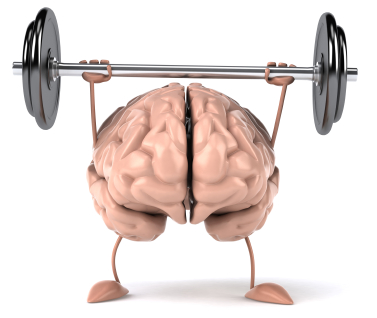

In our last blog post, we discussed how negative experiences can be detrimental to brain development. Today we’re here to discuss just how resilient the brain is and show how the brain can bounce back!
The brain is able to bounce back from negative influences, especially if intervention happens at an early age. Positive influences can work to reverse the damage. In our last blog entry, we discussed briefly how the brain is able to recover from stressful situations during infancy, but in actuality, the brain is working and changing throughout our entire lives. This is known as neuroplasticity. You’ll find a short video clip on neuroplasticity that can further explain the process in the “additional resources” section below.
One way to help build or rebuild your child’s brain is through responsive interactions. This is when you notice and respond to your child’s signals—the sounds, actions, and facial expressions that he may be making. In doing so, you develop the emotional and cognitive parts of their brain. If you recall from the PET brain scan in the last blog post, a child with a deprived brain will have reduced activity and a brain mass in the temporal lobes, where emotions are regulated. Simply noticing your baby is staring at a toy that he cannot reach on his own and giving it to him would show a positive emotional response to the needs of your child. This would then help him develop in the important emotional and cognitive areas of his brain.
Research tell us that a nurturing relationship between a baby and her parents is critical for that child’s successful learning and development. This strong, nurturing bond, (delete comma) is known as attachment, and babies can form attachments with a number of other adults in their lives. Secure attachments begin as a result of nurturing positive relationships. Insecure attachments occur when an adults can’t understand or respond to the child’s needs.
Young children learn best through the relationships they have with those that are caring for them. Parents and teachers are a mirror. When very young children are placed in child care, their provider must also develop similar emotional bonds with the child and parents. Because of this, it’s important to let your child care provider know your parenting style and develop a plan to stay on the same page. By becoming an effective communicator, you’ll be able to provide your child with the warm, loving attachments they need for healthy development. Before infants can use their words, they use their bodies, facial expressions, and sounds to express their needs and feelings. They depend on adults to understand and act on these cues they give. When adults are able to meet their needs, they understand that they are loved and important, which helps them to develop the ability to trust. Even though babies will not remember these exact early experiences, they will build these qualities into their own intuition and personalities, shaping them into understanding people themselves.
Showing respect to children is another way we can help our children’s brain development. It is through respectful relationships and interactions with our children that they experience the respect we have for them and can form positive relationships of their own. These interactions include being respectful of not only your own children, but also of the children and families with whom your child interacts.
Treating children respectfully teaches them that they are worthy of respect and will help them learn how to respect other peers and adults. An easy way to do this is by squatting down when talking to a child and explaining what you’re going to do. For example, explaining to a child that “I’m going to pick you up now,” or “we will be leaving in ten minutes” shows the child that we respect them and view them as important and valuable. It allows them an understanding of what is happening around them and gives them a chance to voice their opinions and ask questions. This helps children feel confident about their identity and also leads to positive self-esteem.
Positive self-esteem is important for a child’s development. It gives them a sense of identity and influences the child’s confidence to learn and face the many challenges of life. Encouraging self-esteem in our children is one of the most important things we can provide for them. One way to promote positive self-esteem is by providing quiet, encouraging feedback. For example, when a child shows you a drawing, instead of asking “what is it?” try saying “tell me about your picture.” Comments like these motivate the child to continue trying and learning and are essential for proper brain development!
Additional Resources
- An inspiring animation demonstrating how we all have the ability to learn and change by rewiring our brains!
- A video from Kindercare about responsive interactions through serve and return
- The Vroom App: Provides you with daily tips on how to grow your child’s mind during his first years of life that’s totally FREE!
Save
Save
